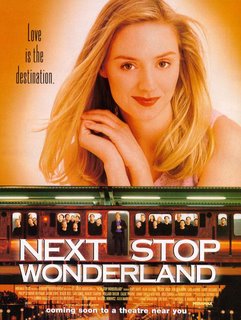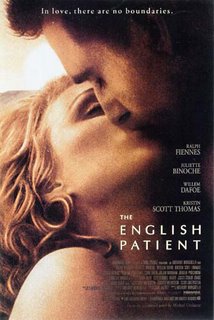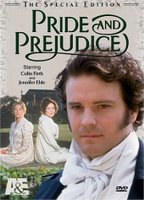The three
Since love seems to be in the air around the scribosphere (Warren Leonard at The Screenwriting Life weighs in on the future of the romantic comedy), I'll wrap up my postings on flimic affairs of the heart with three romances that I think anyone ignores at their peril. And not for ladies only, in my estimation.
 FUNNY
FUNNY
Although Annie Hall remains the gold standard for romantic comedies (except, arguably, for Shakespeare in Love, it is the only one since 1934's It Happened One Night to win an Oscar for Best Picture), my favorite rom-com of late is Brad Anderson's 1998 offering, Next Stop Wonderland.
The always fab Hope Davis stars as Erin Castleton, nurse by night and newly-dumped SWF by day. The film traces Erin's wayward journey from breakup with her social activist granola boy (Philip Seymour Hoffman) into, literally, the arms of a thoughtful plumber (Alan Gelfant) in a crowded car on Boston's T.
Because our couple does not actually meet MEET until the movie's last scenes, the pleasure comes in going along for the ride: watching the orbits of their spheres draw closer and closer to the point of collision that we sense must ultimately occur. Erin enduring a meddlesome mother (Holland Taylor) who takes out a personal ad for her in the local paper, and the inevitable line of losers who desperately respond. Alan suffering through advances from a hot-to-trot marine biology classmate and attempting to move from the blue-collar world he grew up in to a different life working at the New England Aquarium. All set to a cool Jobim-infused bossa nova soundtrack.
In addition to breaking from the "boy meets girl, boy loses girl, boy gets girl" convention that too many of the genre fall into, I think what makes "Wonderland" refreshing is that it is told mostly from Erin's point of view. Instead of the typical pursued object-of-affection role that women in these films often play, Erin is content not only to do the pursuing herself but also, when the suitor pickings look slim, revel in her solitude. She is alone but is not lonely. And, as it occasionally happens in real life, when Erin is least expecting to find love, there it is as if it had been merely waiting for her to catch the right train at the right time on the right day. Well-written and acted, Next Stop Wonderland is one you might have missed when it made the art-house rounds but makes for a good night in on DVD (either by yourself or shared with another).
 EPIC
EPIC
Another Best Picture winner, 1996's The English Patient, gets much grief it seems. Allow me to offer a word or two in its defense.
The conventional wisdom, fueled more by the Seinfeld episode I think than actual movie-watching experiences, is that it is an insufferable snoozefest. Although no doubt long, clocking in at two hours and 40 minutes, I have yet to tire of the smoldering slow burn of its tragic love story, told across the African and Italian theatres of World War II. I understand the criticisms to some extent - too long, nothing happens, "chick flick" - but disagree with them.
Just as the ideal rom-com is somewhere in the 90-minute range and keeps the plot and dialogue popping, there is (or should) still be a place for the BIG romance that takes its time in telling the story. The ideas and circumstances relating to star-crossed love rarely lend themselves to easy exploration or tidy resolution. A soliloquy around the campfire about Gyges and the consequences of looking on that which he should have not is necessary to foretell the fate that will befall Almasy and Katharine when they act on what is forbidden.
And their fall, when it happens, is truly heartbreaking. The film speaks, swimming in the joy of language, to the sad experience of falling for the one you can't have, which I have to think is a fairly universal one. Don't believe the anti-hype if you haven't actually seen it yet. The reputation is fairly undeserved.
 UM, MUSHY
UM, MUSHY
Finally, somewhere between the comedy and the epic, is the just plain old love story. For this, I keep coming back to Henry Jaglom's 1997 Deja Vu. Renowned for his improvisational style and a working friendship with Orson Welles in the later years of Welles' life, Jaglom here concots a both funny and touching tale of love that does manage to transcend the initial barriers that exist between the couple when they first meet.
Dana (Jaglom's real-life wife, Victoria Foyt) is overseas on business, first in Tel Aviv and then to Paris and London. Events - or is it something more? - conspire to bring her to the White Cliffs of Dover, where Sean (Stephen Dillane) paints a landscape that catches Dana's eye. Their worlds intersect further when they return to London together: she to meet up with her fiance at a house of old family friends; he to his wife in the city. To give more of the plot away would ruin it, and even I admit that the final twist strains credulity, but the ending is ultimately satisfying with a bit of the magic and wonder that more conventional romances play for cheap sentiment.
Jaglom's cinema verite bent is what sets apart Deja Vu for me. Although well-plotted, the story retains a natural and unpolished feel. It is more like eavesdropping on a love-in-progress than being spoon-fed the same old formula Hollywood romance. The scene where Dana's hosts (Noel Harrison and Anna Massey) riff in their bed on the childhood delights of chocolates and candy in wartime England distills the essence of their lifetime together and the comfort of their relationship into a moment. Dana and Sean's struggle to love against their existing commitments is as raw as it would be if it actually happened.
As opposed to the tragic love of The English Patient, however, these two are destined for a happier fate. Another indie film that if you blinked you likely missed it, I always find it a good tonic when my faith in Cupid needs a bit of restoration.
And a shout (ahaha) out to Shawna over at Shouting Into the Wind for adding me to the roll. I shall endeavor to live up to the trust that has been placed in me.
 FUNNY
FUNNYAlthough Annie Hall remains the gold standard for romantic comedies (except, arguably, for Shakespeare in Love, it is the only one since 1934's It Happened One Night to win an Oscar for Best Picture), my favorite rom-com of late is Brad Anderson's 1998 offering, Next Stop Wonderland.
The always fab Hope Davis stars as Erin Castleton, nurse by night and newly-dumped SWF by day. The film traces Erin's wayward journey from breakup with her social activist granola boy (Philip Seymour Hoffman) into, literally, the arms of a thoughtful plumber (Alan Gelfant) in a crowded car on Boston's T.
Because our couple does not actually meet MEET until the movie's last scenes, the pleasure comes in going along for the ride: watching the orbits of their spheres draw closer and closer to the point of collision that we sense must ultimately occur. Erin enduring a meddlesome mother (Holland Taylor) who takes out a personal ad for her in the local paper, and the inevitable line of losers who desperately respond. Alan suffering through advances from a hot-to-trot marine biology classmate and attempting to move from the blue-collar world he grew up in to a different life working at the New England Aquarium. All set to a cool Jobim-infused bossa nova soundtrack.
In addition to breaking from the "boy meets girl, boy loses girl, boy gets girl" convention that too many of the genre fall into, I think what makes "Wonderland" refreshing is that it is told mostly from Erin's point of view. Instead of the typical pursued object-of-affection role that women in these films often play, Erin is content not only to do the pursuing herself but also, when the suitor pickings look slim, revel in her solitude. She is alone but is not lonely. And, as it occasionally happens in real life, when Erin is least expecting to find love, there it is as if it had been merely waiting for her to catch the right train at the right time on the right day. Well-written and acted, Next Stop Wonderland is one you might have missed when it made the art-house rounds but makes for a good night in on DVD (either by yourself or shared with another).
 EPIC
EPICAnother Best Picture winner, 1996's The English Patient, gets much grief it seems. Allow me to offer a word or two in its defense.
The conventional wisdom, fueled more by the Seinfeld episode I think than actual movie-watching experiences, is that it is an insufferable snoozefest. Although no doubt long, clocking in at two hours and 40 minutes, I have yet to tire of the smoldering slow burn of its tragic love story, told across the African and Italian theatres of World War II. I understand the criticisms to some extent - too long, nothing happens, "chick flick" - but disagree with them.
Just as the ideal rom-com is somewhere in the 90-minute range and keeps the plot and dialogue popping, there is (or should) still be a place for the BIG romance that takes its time in telling the story. The ideas and circumstances relating to star-crossed love rarely lend themselves to easy exploration or tidy resolution. A soliloquy around the campfire about Gyges and the consequences of looking on that which he should have not is necessary to foretell the fate that will befall Almasy and Katharine when they act on what is forbidden.
And their fall, when it happens, is truly heartbreaking. The film speaks, swimming in the joy of language, to the sad experience of falling for the one you can't have, which I have to think is a fairly universal one. Don't believe the anti-hype if you haven't actually seen it yet. The reputation is fairly undeserved.
 UM, MUSHY
UM, MUSHYFinally, somewhere between the comedy and the epic, is the just plain old love story. For this, I keep coming back to Henry Jaglom's 1997 Deja Vu. Renowned for his improvisational style and a working friendship with Orson Welles in the later years of Welles' life, Jaglom here concots a both funny and touching tale of love that does manage to transcend the initial barriers that exist between the couple when they first meet.
Dana (Jaglom's real-life wife, Victoria Foyt) is overseas on business, first in Tel Aviv and then to Paris and London. Events - or is it something more? - conspire to bring her to the White Cliffs of Dover, where Sean (Stephen Dillane) paints a landscape that catches Dana's eye. Their worlds intersect further when they return to London together: she to meet up with her fiance at a house of old family friends; he to his wife in the city. To give more of the plot away would ruin it, and even I admit that the final twist strains credulity, but the ending is ultimately satisfying with a bit of the magic and wonder that more conventional romances play for cheap sentiment.
Jaglom's cinema verite bent is what sets apart Deja Vu for me. Although well-plotted, the story retains a natural and unpolished feel. It is more like eavesdropping on a love-in-progress than being spoon-fed the same old formula Hollywood romance. The scene where Dana's hosts (Noel Harrison and Anna Massey) riff in their bed on the childhood delights of chocolates and candy in wartime England distills the essence of their lifetime together and the comfort of their relationship into a moment. Dana and Sean's struggle to love against their existing commitments is as raw as it would be if it actually happened.
As opposed to the tragic love of The English Patient, however, these two are destined for a happier fate. Another indie film that if you blinked you likely missed it, I always find it a good tonic when my faith in Cupid needs a bit of restoration.
And a shout (ahaha) out to Shawna over at Shouting Into the Wind for adding me to the roll. I shall endeavor to live up to the trust that has been placed in me.




